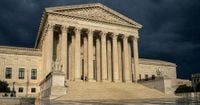Voting rights, a cornerstone of American democracy, are once again at the center of heated legal and political debate as federal courts and the U.S. Supreme Court grapple with the future of race-based redistricting. This week, the small Georgia community of Meriwether County and the entire state of Louisiana find themselves on the front lines of a national battle over who gets to draw political boundaries—and how those lines shape representation for minority voters.
On October 9, 2025, voting rights advocates in Meriwether County, Georgia, filed a federal lawsuit challenging the district maps enacted in 2022 for the local county commission. According to the Georgia Recorder, the suit alleges that the new maps illegally dilute the voting power of Black residents, violating the Voting Rights Act of 1965—a landmark piece of legislation designed to ensure fair representation for minority communities. Although Black voters make up a substantial percentage of Meriwether County’s population, the five-member board of commissioners is currently all white.
The lawsuit, backed by the Georgia NAACP and local residents, claims the redistricting was pushed through over the objection of the county’s then-only Black commissioner, who has since left office. The impact has been immediate and tangible: in one district, the Black voting-age population dropped from about 45% to less than 30% after the new lines were drawn. None of the three Black candidates who have run for county commission since the maps took effect have been successful, fueling frustration and a sense of disenfranchisement among Black residents.
“We will not stand by and watch Black voters in Georgia be stripped of their right to fair representation,” declared Georgia NAACP President Gerald Griggs in a statement published by the Georgia Recorder. He called the maps “a direct attack on this community’s political power.”
The lawsuit proposes a remedy: redraw the district lines to create two new Black-majority districts. One would stretch across the north and central areas, including towns like Greenville, Woodbury, and Lone Oak, while the other would encompass southern parts such as Manchester and Warm Springs. Rev. James Clements, a Black Meriwether County resident and one of the plaintiffs, reflected on the loss of representation. He recounted to the Recorder how the board once included two Black members but now leaves many in the Black community feeling hopeless. “Some Black residents I’ve talked to don’t feel the need to even go to a commissioner meeting, because they don’t feel that their voice is going to be heard,” he said. Clements, who lost a commission race last year by just 12 votes, insists his involvement in the lawsuit is not about his own candidacy but about the right to be represented: “We’d just like the opportunity to be able to be represented at the board of commissioners’ office.”
But the legal ground under the Voting Rights Act may soon shift dramatically. Next week, starting October 14, the U.S. Supreme Court is set to rehear arguments in Louisiana v. Callais, a case that could fundamentally alter—or even eliminate—the requirement that districts be drawn with race in mind to protect minority voting power. According to NOLA.com and The New York Sun, Section 2 of the Voting Rights Act, the provision at the heart of the Louisiana case, has for decades prohibited election practices that dilute minority voting power through racial gerrymandering. It’s been the primary legal tool for challenging district maps that minimize minority representation.
The Louisiana case is complex and politically charged. It began in 2022 when Black voters sued over a congressional map that had only one Black-majority district, despite the state’s population being about one-third Black. A federal court ordered Louisiana to draw a new map with two Black-majority districts, a decision upheld by the 5th Circuit Court of Appeals. Louisiana complied in 2024, but the new map quickly faced a fresh lawsuit—this time from non-African American voters who argued that creating a second majority-Black district amounted to unconstitutional racial gerrymandering, violating the 14th Amendment’s equal protection clause.
In March 2025, the Supreme Court heard oral arguments in the case. Louisiana’s lawyers, according to The New York Sun, defended the map by claiming that politics—not race—was the primary factor in drawing the new districts. They said the lines were designed to protect Republican incumbents in Congress, not to engineer racial outcomes. The Supreme Court has previously ruled that racial gerrymandering is unconstitutional, but that partisan gerrymandering is legal—a distinction that has only muddied the waters further.
But the case took another twist in August, when Louisiana switched its position and stopped defending the 2024 map. In a new brief, the state argued that race-based redistricting is unconstitutional, even when done to remedy past discrimination. “The Equal Protection Clause commands that the government ‘may never use race as a stereotype or negative,’” the state’s lawyers wrote. “Yet race-based redistricting rests on an invidious stereotype: that all minorities, by virtue of their membership in their racial class, think alike and share the same interests and voting preferences.”
The plaintiffs defending the map—Black voters and their advocates—see things very differently. They argue that Section 2 is the “crown jewel of civil rights legislation” and that it “authorizes some consideration of race” to remedy identified racial discrimination. Fair Fight Action and Black Voters Matter, two prominent voting rights groups, warned this week that if Section 2 is gutted, Republicans could pick up as many as 27 additional safe seats in the House of Representatives, cementing control for a generation. Their report, as cited by The New York Sun, states, “It’s enough to cement one-party control of the U.S. House for at least a generation.”
Conservatives, meanwhile, argue that race-based redistricting is not only unconstitutional but increasingly unnecessary. They point to the increased access to the ballot box for minority voters since 1965 and question whether the law’s race-conscious remedies are still justified. Some also see the legal battles as part of a broader strategy by both parties to secure partisan advantage in a narrowly divided Congress. As NOLA.com’s Stephanie Grace notes, “Districting through the legislative process is about the most political act there is, and is just about always about creating winners and losers.”
There’s growing support for the idea of independent commissions to draw district lines, a reform that some believe could reduce both racial and partisan gerrymandering. Ironically, California, which adopted such commissions, is now considering reversing course to avoid unilaterally disarming against states like Texas, where mid-decade redistricting is being used to maximize partisan gains.
The stakes could hardly be higher. The Supreme Court’s ruling in Louisiana v. Callais could reshape the rules of American democracy, affecting not just the immediate fates of Meriwether County and Louisiana, but the balance of power in Congress and the future of minority representation nationwide. As the country waits for the justices to weigh in, communities across the nation are left wondering: will the promise of equal representation endure, or is it on the verge of being rewritten?


